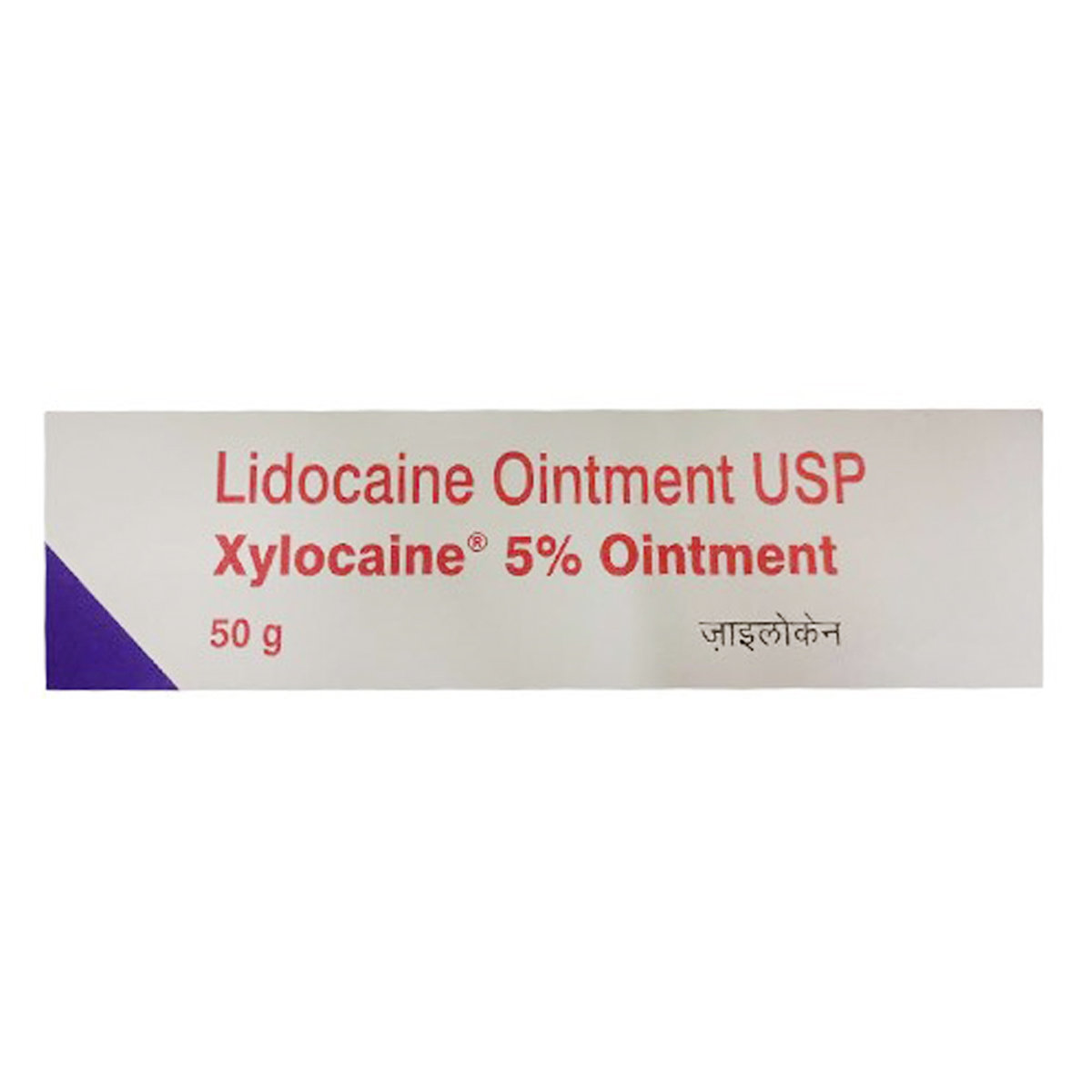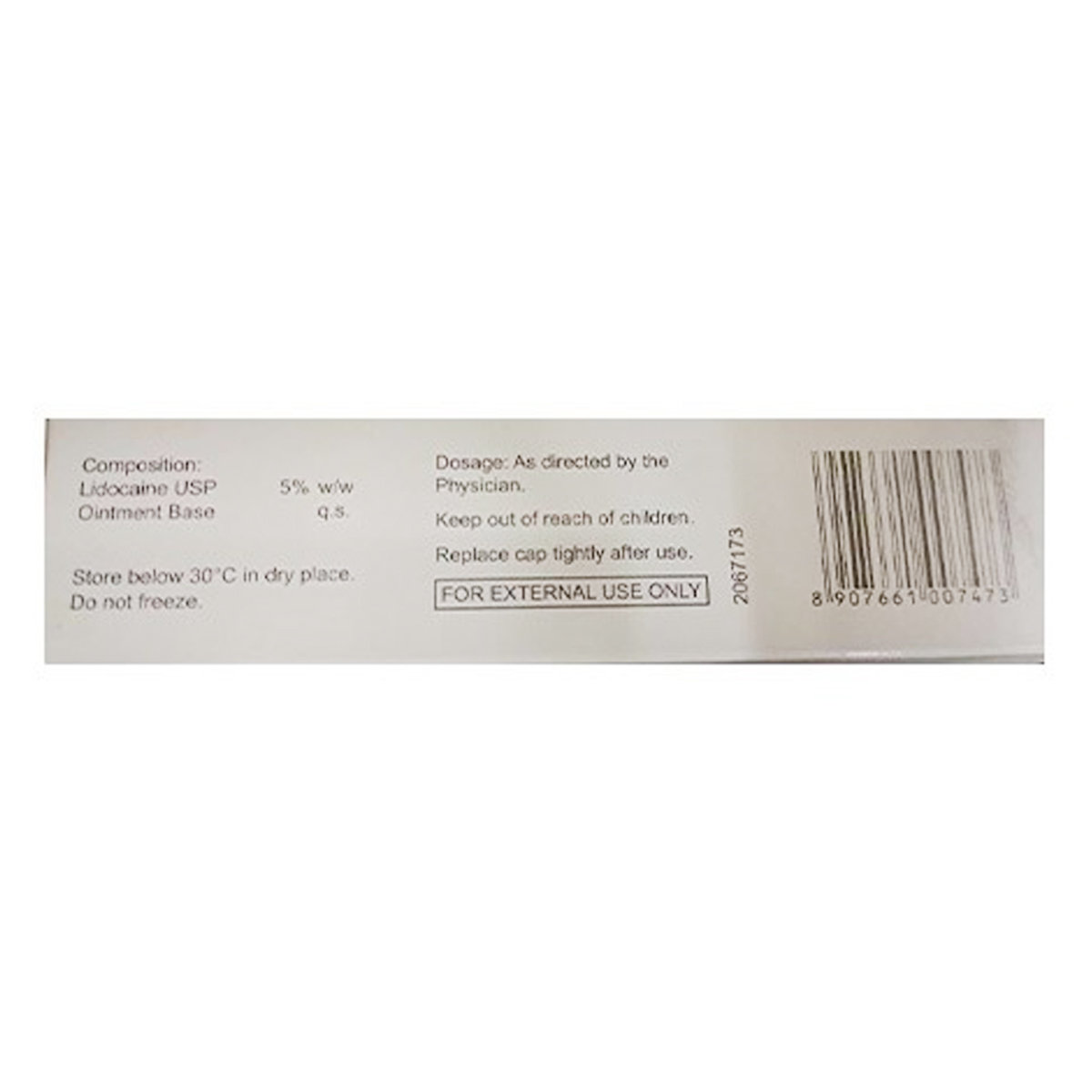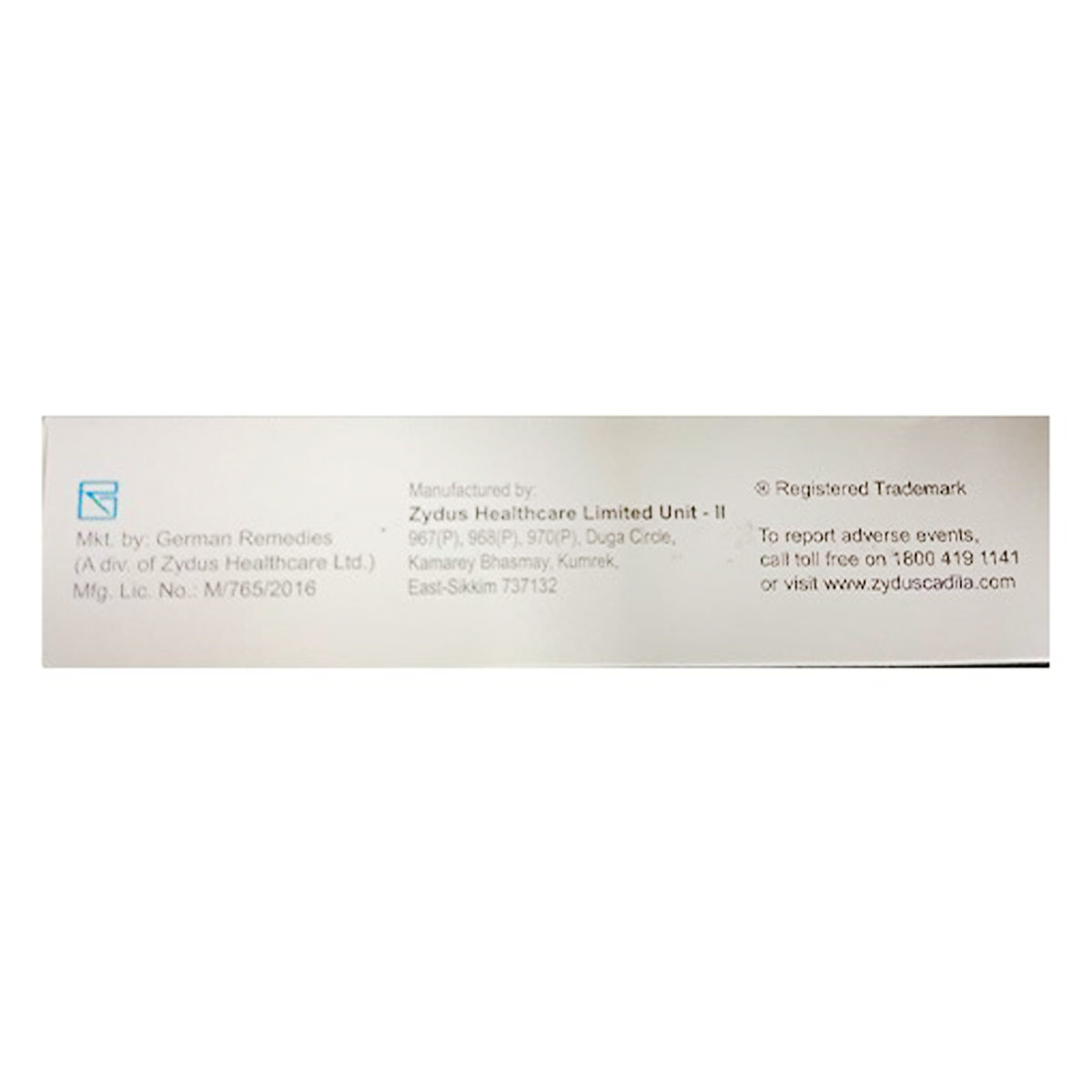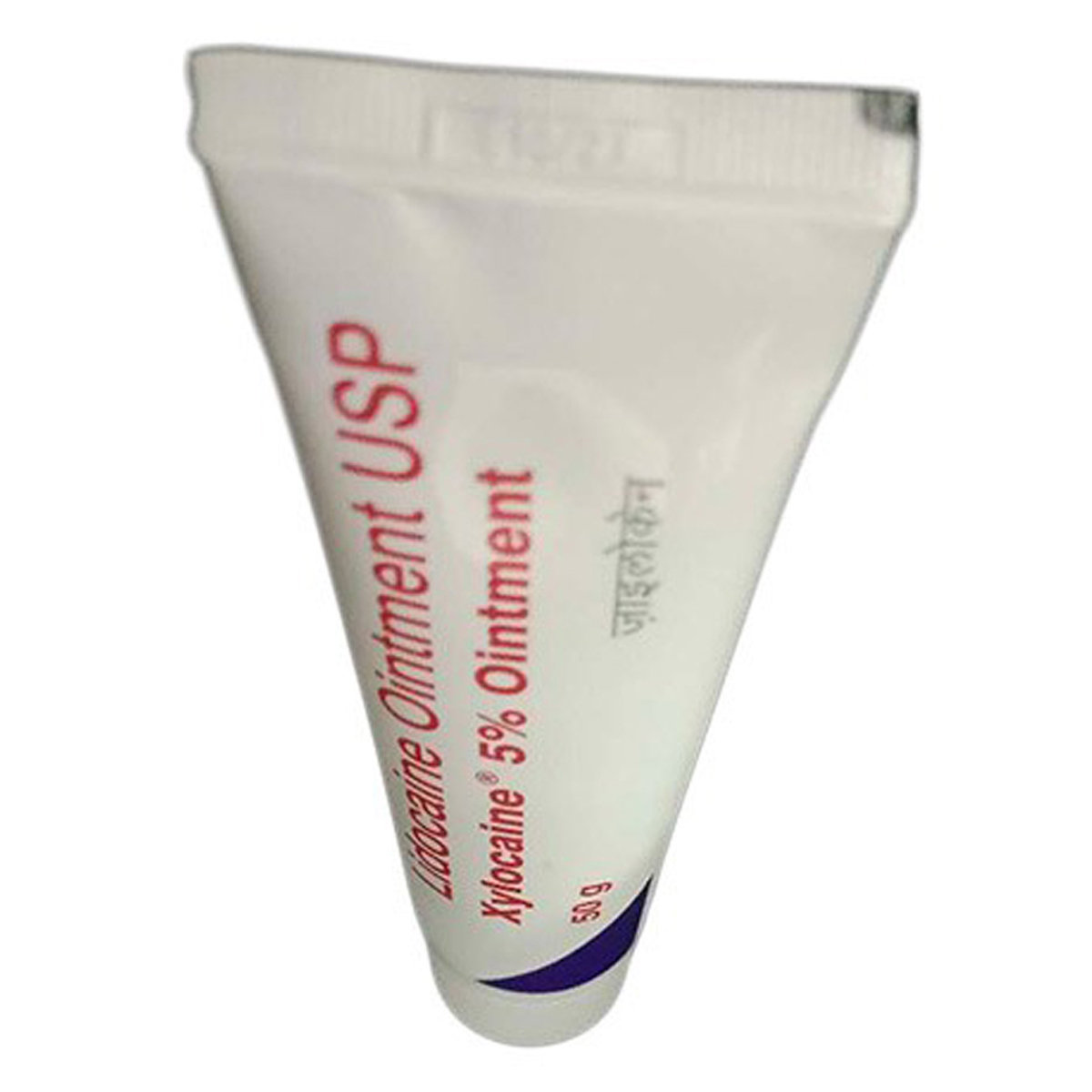Xylocaine 5% Ointment 50 gm




Selected Pack Size:50 gm
50 gm ₹51.8
(₹1.04 / 1 gm)
In Stock
20 gm ₹51.8
(₹2.59 / 1 gm)
In Stock
MRP ₹57.5
(Inclusive of all Taxes)
₹8.6 Cashback (15%)
Xylocaine Ointment is used to reduce/relieve pain and discomfort associated with skin irritation, burns, scratches, insect bites, skin abrasions, or sunburn. It is also used to treat post-herpetic neuralgia, premature ejaculation, pain in urethritis (inflammation of the urethra) and as an adjunct for endotracheal intubation. It contains Lidocaine, which produces local numbness by blocking the nerve signal in the affected area. In some cases, it may cause application site reactions such as burning sensation, itching, redness, and irritation.
Know Your Delivery Time
Provide Delivery Location

Secure Payment

India's Most Trusted Pharmacy

Genuine Products
Composition :
Manufacturer/Marketer :
Consume Type :
Return Policy :
Expires on or after :
About Xylocaine Ointment
Xylocaine Ointment belongs to the class of local anaesthetics used to reduce/relieve pain and discomfort associated with skin irritation, burns, scratches, insect bites, skin abrasions, or sunburn. It is also used to treat post-herpetic neuralgia (lasting pain after a shingles infection).
Lidocaine may also be used to treat premature ejaculation. It is also indicated for the prevention and control of pain in urethritis (inflammation of the urethra). It may also be used as an adjunct for endotracheal intubation.
Xylocaine Ointment contains lidocaine, which produces local numbness by blocking the nerve signal in the affected area. Hence, Xylocaine Ointment produces an anaesthetic effect and helps decrease the sensation of pain.
In some cases, Xylocaine Ointment may cause application site reactions such as burning sensation, itching, redness, and irritation. Most of these side effects do not require medical attention and will resolve gradually over time. However, talk to your doctor if the side effects persist.
Consult your doctor before using Xylocaine Ointment if you are pregnant or breastfeeding. Xylocaine Ointment is not recommended for children as safety and effectiveness have not been established. Avoid contact of Xylocaine Ointment with eyes, nose, or mouth. If contact occurs, rinse with water immediately.
Uses of Xylocaine Ointment
Xylocaine Ointment is used in the treatment of reducing/relieving pain and discomfort (local anaesthesia), post-herpetic neuralgia, and premature ejaculation as an adjunct for endotracheal intubation. The detailed uses of Xylocaine Ointment are as follows:
- Local Anaesthetic: Xylocaine Ointment acts as a local anaesthetic, numbing the skin to reduce pain and discomfort during injections or minor surgeries.
- Post-surgical Pain Relief: Xylocaine Ointment provides post-surgical pain relief by numbing the skin, alleviating localised pain and discomfort after surgery.
- Skin Irritation Management: Xylocaine Ointment numbs the skin, providing temporary relief from irritation caused by minor burns, insect bites, eczema, psoriasis, dermatitis, and other skin conditions by blocking nerve signals.
- Dermatological Procedures: Xylocaine Ointment is used before dermatological procedures like laser treatments or chemical peels to numb the skin, reducing pain and discomfort.
- Sexual Activity support: In some cases, Xylocaine Ointment application can be used to help manage premature ejaculation in men by numbing the area, thus extending sexual activity duration.

Have a query?
Directions for Use
- Follow your doctor's instructions on the dosage and timing of this medication to ensure safe and effective use.
- Clean and dry the affected area. Apply the prescribed dose to the affected area.
- Do not apply Xylocaine Ointment to skin with cuts, open wounds, infections, or rashes.
- Xylocaine Ointment is for external use only. If Xylocaine Ointment comes in contact with eyes, nose or mouth, rinse with water immediately.
Medicinal Benefits
- Xylocaine Ointment provides effective pain relief and numbing in cases of skin irritation, burns, scratches, insect bites, skin abrasions, and sunburn.
- It helps manage post-herpetic neuralgia (nerve pain after shingles).
- It is used for the prevention and control of pain associated with urethritis (inflammation of the urethra).
- It acts as an adjunct during endotracheal intubation to reduce discomfort during the procedure.
- Xylocaine Ointment works by blocking the entry of sodium ions into nerve membranes, preventing the transmission of pain signals.
- It produces a local anaesthetic effect that decreases pain sensation in the affected area.
- It may be used to treat premature ejaculation by reducing skin sensitivity and helping delay ejaculation.
- Xylocaine Ointment provides fast and targeted pain relief, improving comfort and recovery in various painful or irritating conditions.
How Xylocaine Ointment Works
Storage
- Consult your doctor if you experience skin redness, itching, or irritation after taking medication.
- Your doctor may adjust your treatment plan by changing your medication or providing guidance on managing your erythema symptoms.
- Your doctor may recommend or prescribe certain medications to help alleviate symptoms.
- Apply cool compresses or calamine lotion to the affected skin area to reduce redness and itching.
- Stay hydrated by drinking plenty of water to help alleviate symptoms and keep your skin hydrated.
- Monitor your skin condition closely and promptly report any changes, worsening symptoms, or concerns to your healthcare provider.
- Report the itching to your doctor immediately; they may need to change your medication or dosage.
- Use a cool, damp cloth on the itchy area to help soothe and calm the skin, reducing itching and inflammation.
- Keep your skin hydrated and healthy with gentle, fragrance-free moisturizers.
- Try not to scratch, as this can worsen the itching and irritate your skin.
- If your doctor prescribes, you can take oral medications or apply topical creams or ointments to help relieve itching.
- Track your itching symptoms and follow your doctor's guidance to adjust your treatment plan if needed. If the itching persists, consult your doctor for further advice.
- Consult and seek guidance from a doctor or healthcare expert to determine the cause and best course of treatment.
- Avoid harsh products, extreme temperatures, and other potential irritants that may exacerbate the issue.
- Depending on the location and severity of the burning, your healthcare professional may recommend applying a soothing or protective agent, such as a cream, gel, or ointment.
- Keep the affected area clean to promote healing and prevent further irritation.
- Schedule follow-up appointments with your healthcare professional to monitor your symptoms and adjust your treatment plan as needed.
- If the burning or irritation persists or worsens, seek medical attention for further guidance and treatment.
What if I have taken an overdose of Xylocaine Ointment
Drug Warnings
- Do not use Xylocaine Ointment if you are allergic to any of its components.
- Avoid using Xylocaine Ointment on larger skin areas or for a prolonged duration.
- Inform your doctor if you have methemoglobinemia (abnormal methemoglobin in the blood), heart, kidney or liver problems.
- Consult your doctor before using Xylocaine Ointment if you are pregnant or breastfeeding.
- Xylocaine Ointment is not recommended for children as safety and effectiveness have not been established.
Drug-Drug Interactions
Drug-Drug Interactions
Login/Sign Up
Drug-Food Interactions
Drug-Food Interactions
Login/Sign Up
Diet & Lifestyle Advise
- Maintain a healthy weight by performing regular low-strain exercises and eating healthy food.
- Get adequate sleep as resting the muscles can help in reducing inflammation and swelling.
- De-stress yourself by meditating, reading books, taking a warm bubble bath, or listening to soothing music.
- Eat food rich in antioxidants such as berries, spinach, kidney beans, dark chocolate, etc.
- Foods containing flavonoids help in reducing inflammation. These include soy, berries, broccoli, grapes, and green tea.
- Avoid smoking and alcohol consumption.
Habit Forming
Therapeutic Class
RX
Out of StockLox 5% Ointment 20gm
Ultra Drugs Pvt Ltd
₹23.5
(₹1.06/ 1gm)
1% COSTLIERRX
Xylocaine 5% Ointment 20 gm
Astra Zeneca Pharma India Ltd
₹57.5
(₹2.59/ 1gm)
149% COSTLIER
Alcohol
Consult your doctor
It is unknown if alcohol affects Xylocaine Ointment. Please consult your doctor if you have any concerns.
Pregnancy
Consult your doctor
Please consult your doctor if you have any concerns regarding this; your doctor will prescribe Xylocaine Ointment only if the benefits outweigh the risks.
Breast Feeding
Consult your doctor
Please consult your doctor if you have any concerns regarding this; your doctor will decide whether breastfeeding mothers can use Xylocaine Ointment or not.
Driving
Consult your doctor
It is not known if Xylocaine Ointment affects your ability to drive. Drive only if you are alert after using Xylocaine Ointment.
Liver
Consult your doctor
Please consult your doctor if you have a liver impairment or any concerns regarding this.
Kidney
Consult your doctor
Please consult your doctor if you have kidney impairment or any concerns regarding this.
Children
Unsafe
Xylocaine Ointment is not recommended for children as efficacy and safety have not been established.
Heart
Please consult your doctor before using Xylocaine Ointment if you have pre-existing heart problems. This medicine should be avoided in arrhythmia patients.
Geriatrics
Consult your doctor
Please consult a doctor before giving Xylocaine Ointment to geriatric patients. Your doctor will prescribe Xylocaine Ointment if the benefits outweigh the risks.
FAQs
Xylocaine Ointment belongs to the class of local anaesthetics used to reduce/relieve pain and discomfort. It also treats post-herpetic neuralgia (lasting pain after a shingles infection). It may also be used to treat premature ejaculation. It is also indicated for preventing and controlling pain in urethritis (inflammation of the urethra). It may also be used as an adjunct for endotracheal intubation.
Xylocaine Ointment blocks the influx of sodium ions into the membrane that surrounds the nerves, thereby preventing initiation and conduction of impulses (nerve signal). Hence, it provides an anaesthetic effect and decreases the sensation of pain.
Avoid concomitant use of Xylocaine Ointment with other topical products such as cosmetics, sunscreens, lotions, moisturisers, insect repellent creams, and other gels.
Do not apply external heat or cover the treated skin with dressings after applying Xylocaine Ointment. Covering the skin or applying heat might increase the amount of drug absorbed into the skin, leading to unpleasant side effects.
Do not apply Xylocaine Ointment on open wounds, injured skin, or unhealed shingles blisters. Apply Xylocaine Ointment on intact skin only.
Avoid using Xylocaine Ointment for longer durations unless prescribed by the doctor. If your condition does not improve even after using Xylocaine Ointment for 7 days, consult your doctor.
Country of origin
Manufacturer/Marketer address
Disclaimer
Author Details
We provide you with authentic, trustworthy and relevant information
Reference
- https://www.drugs.com/mtm/lidocaine-topical.html
- https://www.accessdata.fda.gov/drugsatfda_docs/label/2015/020612s012lbl.pdf
- https://www.accessdata.fda.gov/drugsatfda_docs/anda/2011/040837Orig1s000.pdf
- https://www.webmd.com/drugs/2/drug-171248/burn-spray-lidocaine-topical/details
- https://medlineplus.gov/druginfo/meds/a603026.html
- https://www.nps.org.au/medicine-finder/versatis-transdermal-patches
- https://www.drugs.com/cdi/lidocaine-patch.html
Buy best Anaesthetics products by
Neon Laboratories Ltd
Samarth Life Sciences Pvt Ltd
Themis Pharmaceutical Ltd
Troikaa Pharmaceuticals Ltd
Abbott India Ltd
Celon Laboratories Pvt Ltd
Astra Zeneca Pharma India Ltd
Baxter India Pvt Ltd
Core Claris Lifesciences Ltd
Ajanta Pharma Ltd
Indoco Remedies Ltd
Miracalus Pharma Pvt Ltd
Torrent Pharmaceuticals Ltd
VARENYAM HEALTHCARE PVT LTD
Zydus Cadila
AP Pharmaceutical
Acurela Pharms Ltd
Aesmira Lifesciences Pvt Ltd
Elder Pharmaceuticals Ltd
Fresenius Kabi India Pvt Ltd
Galpha Laboratories Ltd
Hetero Healthcare Pvt Ltd
Pure Derma Healthcare Pvt Ltd
Themis Medicare Ltd
Amneal Healthcare Pvt Ltd
Amwill Healthcare Pvt Ltd
Anglo French Drugs & Industries Ltd
B Braun Melsungen AG
Cadila Pharmaceuticals Ltd
Claris Lifesciences Ltd
Dr Reddy's Laboratories Ltd
Ethinext Pharma
Fortel Life Sciences
Intas Pharmaceuticals Ltd
Kshipra Health Solutions
Meghmani Lifesciences
Rely On Pharmaceuticals
Salve Pharmaceuticals Pvt Ltd
Skinocean Pharmaceuticals
Sunways (India) Pvt Ltd
Wockhardt Ltd
Zydus Healthcare Ltd
6Ipain Healthcare Pvt Ltd
Admac Lifesciences(Oncology)
Adonis Phytoceuticals Pvt Ltd
Aespire Formulations Pvt Ltd
Aishwarya Healthcare
Albatross Healthcare Pvt Ltd
Amps Biotech Biotech Pvt Ltd
Anchal Life Science Pvt Ltd
Atopic laboratories Pvt Ltd
Biovenice Criticure
Cadila Healthcare Ltd
Caitlin Life Care
Cellgen Biopharma
Celtiss Therapeutics Pvt Ltd
Cipla Ltd
Coax Bioremedies Pvt Ltd
Cosmofix Technovation Private Limited
Cosmofix Technovation Pvt Ltd
Delvin Formulations (P) Ltd
East West Pharma India Pvt Ltd
Entod Pharmaceuticals Ltd
Eumedica Llp
Flagship Biotech International Pvt Ltd
Foremost Marketing Pvt Ltd
Fusion Health Care Pvt Ltd
German Remedies Ltd
Global Dent Aids Pvt Ltd
Greycells Lifesciences Pvt Ltd
Hilfen Pharmaceuticals Pvt Ltd
Himeros Pharmaceuticals Pvt Ltd
Ici India Ltd
Icpa Health Products Ltd
Icpa Lab
Idem Health Products Pvt Ltd
Ikon Remedies Pvt Ltd
Kopran Laboratories Ltd
Leeford Healthcare Ltd
MSP Pharmaceuticals
Medimarck Biotech
Modi Mundipharma Pvt Ltd
Morepen Laboratories Ltd
Mylan Pharmaceuticals Pvt Ltd
Optima Healthcare Solutions
Pericles Pharma
Pharmadent Remedies Pvt Ltd
Piramal Enterprises Ltd
Prevego Healthcare & Research Pvt Ltd
Pristine Pearl Pharma Pvt Ltd
Qualimed Bioscience
Questus Pharma Pvt Ltd
Rainbow Laboratories (India) Pvt Ltd
Ranbaxy Laboratories Ltd
Rusan Healthcare Pvt Ltd
SAVEO HEALTHTECH PVT LTD
SKINEDIFY PVT LTD
Scott Edil Pharmacia Ltd
Sharing Formulations Pvt Ltd
Sparsha Pharma International Pvt Ltd






